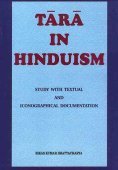Matrikabheda, Mātṛkabheda, Matrika-bheda: 1 definition
Introduction:
Matrikabheda means something in Hinduism, Sanskrit. If you want to know the exact meaning, history, etymology or English translation of this term then check out the descriptions on this page. Add your comment or reference to a book if you want to contribute to this summary article.
The Sanskrit term Mātṛkabheda can be transliterated into English as Matrkabheda or Matrikabheda, using the IAST transliteration scheme (?).
In Hinduism
Ayurveda (science of life)
Source: Google Books: The Alchemical BodyMātṛkabheda (मातृकभेद) is the name of a text related to Rasaśāstra (Indian alchemy) from the tenth century.—There exists a sizable corpus of works on Tantric sorcery—works that may be classified under the general heading of Kriyā Tantras—which include chapters on or references to alchemical preparations and procedures. A final text belongs to a category all its own. This is the ca. thirteenth-century Mātṛkabheda-Tantra, a Śākta-Śaiva work on the Tantric worship of Śiva and the Goddess, whose first, fifth, and eighth chapters contain original alchemical data mainly pertaining to the fabrication of mercurial liṅgas.

Āyurveda (आयुर्वेद, ayurveda) is a branch of Indian science dealing with medicine, herbalism, taxology, anatomy, surgery, alchemy and related topics. Traditional practice of Āyurveda in ancient India dates back to at least the first millenium BC. Literature is commonly written in Sanskrit using various poetic metres.
See also (Relevant definitions)
Partial matches: Matrika, Bheda.
Starts with: Matrikabhedatantra.
Query error!
Full-text: Matrikabhedatantra.
Relevant text
Search found 2 books and stories containing Matrikabheda, Mātṛkabheda, Matrika-bheda, Mātṛka-bheda, Matrka-bheda, Matrkabheda; (plurals include: Matrikabhedas, Mātṛkabhedas, bhedas, Matrkabhedas). You can also click to the full overview containing English textual excerpts. Below are direct links for the most relevant articles:
Notices of Sanskrit Manuscripts (by Rajendralala Mitra)
Devi Tantra, Mantra, Yantra (study) (by Srider Basudevan Iyer)
Specific days for worship and Festivals < [Chapter 4 - Worship and The Worshipper]
Sadhya worship accessories (5): Offerings < [Chapter 4 - Worship and The Worshipper]
Sadhya worship accessories (3): Gandha or Fragrance < [Chapter 4 - Worship and The Worshipper]
Related products
